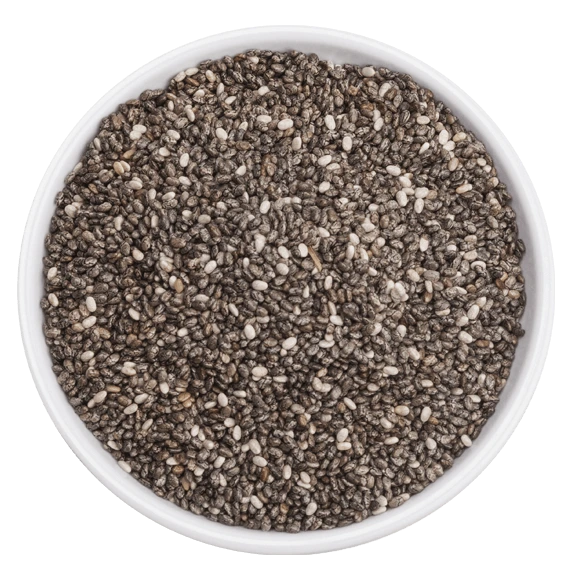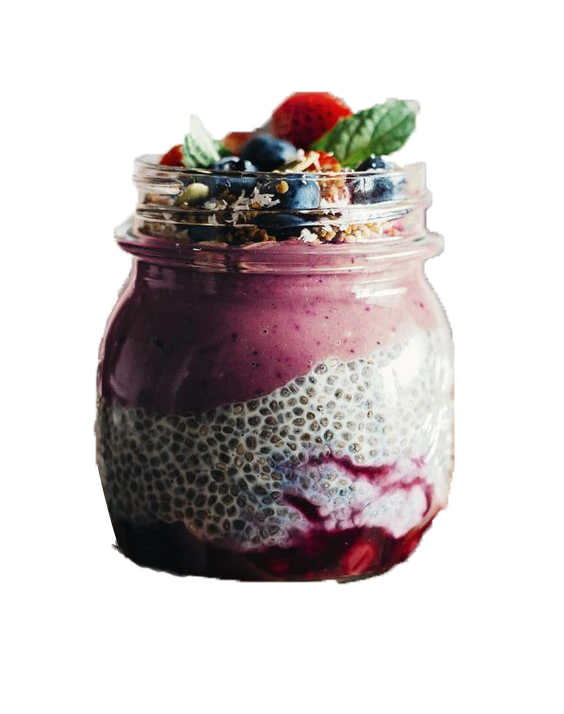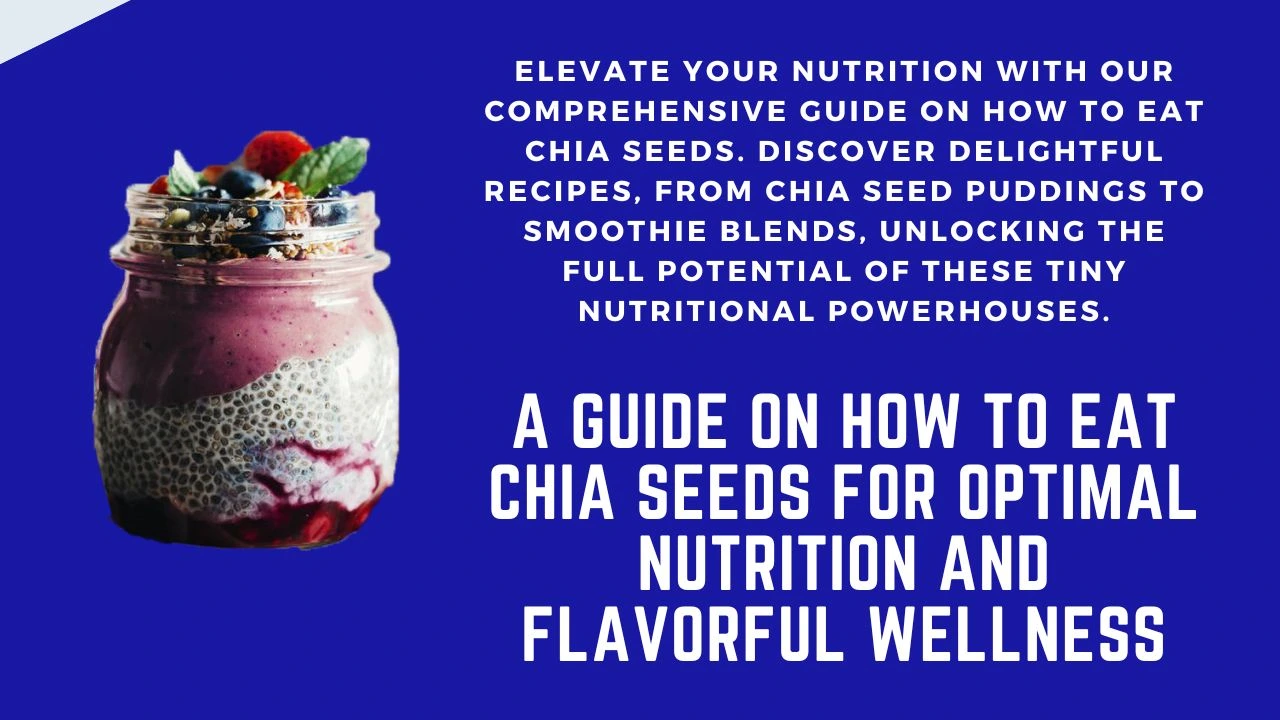Eating Chia Seeds: A Nutrient-Packed Guide
Elevate your nutrition with our comprehensive guide on how to eat chia seeds. Discover delightful recipes, from chia seed puddings to smoothie blends, unlocking the full potential of these tiny nutritional powerhouses. Explore innovative ways to incorporate chia seeds into your daily diet for a flavorful journey to wellness.
Chia seeds, derived from the Salvia hispanica plant, have gained widespread popularity for their nutritional density and versatility. Whether you’re a seasoned health enthusiast or just exploring new dietary options, incorporating chia seeds into your daily routine can offer a host of benefits. Here’s a guide on how to make the most of eating chia seeds.

Chia Seed Nutrion Value Per 100gm:
| Nutrient | Amount per 100g |
|---|---|
| Calories | 486 kcal |
| Protein | 16.54 g |
| Total Fat | 30.74 g |
| – Saturated Fat | 3.33 g |
| – Monounsaturated Fat | 2.309 g |
| – Polyunsaturated Fat | 23.665 g |
| Carbohydrates | 42.12 g |
| – Dietary Fiber | 34.4 g |
| – Sugars | 0.33 g |
| Calcium | 631 mg |
| Iron | 7.72 mg |
| Magnesium | 335 mg |
| Phosphorus | 860 mg |
| Potassium | 407 mg |
| Sodium | 16 mg |
| Zinc | 4.58 mg |
| Vitamin C | 1.6 mg |
| Vitamin B6 | 0.17 mg |
| Folate | 49 mcg |
| Omega-3 Fatty Acids | 17.83 g |
| Omega-6 Fatty Acids | 5.84 g |
These values are approximate and can vary based on factors such as the source and processing of chia seeds. Always refer to specific product labels for the most accurate information.
Here Some reciepies mentioned below:
1. Chia Pudding
Ingredients:
- 1/4 cup chia seeds
- 1 cup milk (dairy or plant-based)
- Sweetener of choice (honey, maple syrup, or agave)
- Vanilla extract (optional)

Instructions:
- Mix chia seeds with milk in a jar.
- Add sweetener to taste and a dash of vanilla extract if desired.
- Stir well and refrigerate for at least a few hours or overnight.
- Top with your favorite fruits or nuts before serving.
2. Chia Smoothies
Ingredients:
- 2 tablespoons chia seeds
- 1 cup liquid (water, juice, or almond milk)
- Fresh or frozen fruits
- Yogurt or a dairy-free alternative

Instructions:
- Add chia seeds to your liquid of choice and let them soak for 10-15 minutes.
- Blend the soaked chia seeds with fruits, yogurt, and ice.
- Enjoy a nutrient-packed chia smoothie for a refreshing meal or snack.
3. Chia Jam
Ingredients:
- 1 cup fresh or frozen berries
- 2 tablespoons chia seeds
- Sweetener to taste
Instructions:
- Cook berries in a saucepan until they break down and become syrupy.
- Mash the berries and stir in chia seeds.
- Sweeten to taste and let it cool.
- Spread this chia jam on toast or use it as a topping for yogurt.
4. Chia in Baking
Ingredients:
- Chia seeds (substitute for eggs)
- Your favorite baking recipe
Instructions:
- Mix 1 tablespoon of chia seeds with 3 tablespoons of water to replace one egg.
- Let the mixture sit for 15 minutes until it forms a gel-like consistency.
- Use it in your baking recipes as a vegan-friendly egg substitute.
5. Chia in Salads and Yogurt
Instructions:
- Sprinkle chia seeds over salads or add them to your favorite yogurt.
- Let them sit for a few minutes to absorb moisture and add a delightful crunch to your dish.
Remember, chia seeds can absorb many times their weight in liquid, so experiment with ratios to achieve your preferred consistency. Whether you’re aiming for a quick breakfast, a healthy snack, or a creative addition to your recipes, incorporating chia seeds into your diet is a simple and delicious way to boost your nutritional intake.
Now that you know how to eat chia seeds, feel free to explore the endless possibilities these tiny seeds offer in enhancing the flavor and nutrition of your meals.
Dangers of Chia Seeds
While chia seeds are celebrated for their nutritional benefits, it’s crucial to be aware of potential risks and limitations associated with their consumption. Here, we explore the potential dangers of chia seeds to ensure you make informed choices about incorporating them into your diet.
1. Choking Hazard
Chia seeds have a unique ability to absorb liquid and swell into a gel-like consistency. However, when consumed dry, especially in large quantities without adequate hydration, they can pose a choking hazard. It’s essential to mix chia seeds with liquids, allowing them to expand before consumption.
2. Gastrointestinal Issues
The high fiber content in chia seeds, while beneficial for digestion in moderation, can lead to gastrointestinal discomfort if consumed excessively. Rapidly increasing fiber intake may cause bloating, gas, and abdominal discomfort. It’s advisable to introduce chia seeds gradually into your diet to allow your digestive system to adjust.
3. Hydration Imbalance
Chia seeds’ remarkable ability to absorb water means they can contribute to dehydration if not consumed with sufficient fluids. Failing to drink enough water alongside chia seed intake may result in constipation or discomfort. Maintaining adequate hydration levels is crucial when incorporating chia seeds into your diet.
4. Allergic Reactions
While rare, some individuals may be allergic to chia seeds. Allergic reactions can manifest as itching, swelling, or respiratory issues. If you experience any adverse reactions after consuming chia seeds, it’s essential to seek medical attention promptly.
5. Blood Pressure Medication Interactions
Chia seeds contain a significant amount of omega-3 fatty acids, which may have blood-thinning properties. Individuals taking blood-thinning medications should exercise caution, as excessive omega-3 intake could potentially interact with these medications, leading to complications. Consulting with a healthcare professional is advisable for those on blood-thinning medication.
6. Nutrient Absorption Concerns
In some cases, excessive consumption of chia seeds may interfere with the absorption of certain minerals due to their phytic acid content. This could potentially impact the absorption of minerals like calcium, zinc, and iron. Balancing chia seed intake with a varied and nutrient-rich diet can help mitigate this concern.
Chia Seeds Side Effects In Females
While chia seeds are celebrated for their nutritional profile, it’s important to be aware of potential side effects, especially for females. Here, we explore potential concerns related to the consumption of chia seeds specific to women.
1. Hormonal Imbalance
Chia seeds contain phytoestrogens, plant compounds with estrogen-like effects. While these compounds can have benefits, excessive consumption may potentially contribute to hormonal imbalances in some women. It’s advisable for individuals with hormone-sensitive conditions to monitor their chia seed intake and consult with a healthcare professional if needed.
2. Digestive Discomfort
The high fiber content in chia seeds, while beneficial for digestive health, can lead to discomfort if consumed in excess. Some women may experience bloating, gas, or abdominal cramps. Gradual incorporation into the diet and ensuring adequate hydration can help minimize digestive issues.
3. Interaction with Medications
For women taking medications that may be impacted by blood-thinning properties, such as anticoagulants, the omega-3 fatty acids in chia seeds could pose a risk. It’s crucial to consult with a healthcare provider to determine the appropriate chia seed intake, especially if there are concerns about potential interactions with medications.
4. Impact on Menstrual Cycle
Limited research suggests that the phytoestrogens in chia seeds might have a subtle impact on the menstrual cycle. While the evidence is not conclusive, women with irregular menstrual cycles or those trying to conceive may consider monitoring their chia seed intake and consulting with a healthcare professional if concerns arise.
5. Allergic Reactions
As with any food, some women may be allergic to chia seeds, experiencing symptoms such as itching, swelling, or respiratory issues. If allergic reactions occur, seeking prompt medical attention is crucial.
6. Mineral Absorption
Chia seeds contain phytic acid, which can potentially interfere with the absorption of minerals like calcium, zinc, and iron. Women with specific nutritional needs, such as those who are pregnant or breastfeeding, should ensure a balanced diet that includes a variety of nutrient sources.
Chia Seeds Benefits For Females
Chia seeds, often hailed as a superfood, bring a multitude of health benefits that particularly cater to the well-being of females. Here, we explore the remarkable advantages of incorporating chia seeds into the diet for women.
1. Rich in Omega-3 Fatty Acids
Chia seeds are an excellent source of omega-3 fatty acids, including alpha-linolenic acid (ALA). These essential fats play a crucial role in supporting heart health, reducing inflammation, and contributing to overall well-being, particularly important for women.
2. High Fiber Content for Digestive Health
With a high fiber content, chia seeds promote optimal digestive health. Adequate fiber intake is beneficial for preventing constipation and maintaining a healthy gut, which is of particular importance for women’s overall wellness.
3. Weight Management Support
Chia seeds can be a valuable ally for females aiming to manage their weight. The combination of fiber and healthy fats in chia seeds contributes to a feeling of fullness, aiding in appetite control and supporting weight management goals.
4. Bone Health Boost
Chia seeds are a good source of calcium, magnesium, and phosphorus essential minerals for maintaining strong and healthy bones. This is particularly beneficial for women, as they are more susceptible to conditions like osteoporosis.
5. Balancing Hormones with Phytoestrogens
Chia seeds contain phytoestrogens, plant compounds that exhibit estrogen-like effects. While research is ongoing, some studies suggest that phytoestrogens may help balance hormones in women, potentially alleviating symptoms related to hormonal fluctuations.
6. Energy Boost and Endurance
For women leading active lifestyles, chia seeds can provide a natural energy boost. The combination of carbohydrates, protein, and fats in chia seeds makes them an excellent choice for sustaining energy levels, supporting endurance during physical activities.
7. Antioxidant Protection
Chia seeds are rich in antioxidants, including chlorogenic acid and caffeic acid. These antioxidants help combat oxidative stress and may contribute to skin health, providing women with a natural means of promoting a radiant complexion.
8. Blood Sugar Regulation
The soluble fiber in chia seeds contributes to stabilizing blood sugar levels, making them a beneficial addition to the diet for women managing conditions like diabetes or those aiming to prevent blood sugar spikes.
9. Versatile Culinary Ingredient
Beyond their nutritional benefits, chia seeds are incredibly versatile in the kitchen. Women can easily incorporate them into various recipes, including smoothies, yogurt, salads, and desserts, enhancing both flavor and nutrition.
Chia Seeds For Weight Loss
Chia seeds have emerged as a popular choice for individuals on a weight loss journey, thanks to their unique nutritional composition and versatile applications in the kitchen. Let’s delve into how incorporating chia seeds into your diet can be a strategic and flavorful approach to achieving your weight loss goals.
1. Rich in Fiber for Satiety
Chia seeds boast an impressive fiber content, with each tiny seed packing a punch of both soluble and insoluble fiber. This fiber plays a crucial role in promoting a feeling of fullness, reducing overall calorie intake, and curbing unnecessary snacking – all vital components of a successful weight loss strategy.
2. Hydration and Swelling Properties
Chia seeds have a remarkable ability to absorb liquid and swell, forming a gel-like consistency. When consumed with water or other fluids, they expand in the stomach, contributing to a sense of satiety. This unique property aids in portion control and can be particularly beneficial for those aiming to manage their calorie intake.
3. Balancing Blood Sugar Levels
The soluble fiber in chia seeds slows down the absorption of sugar, helping to regulate blood sugar levels. This is particularly advantageous for weight management, as stable blood sugar levels contribute to sustained energy levels and reduced cravings for sugary snacks.
4. Healthy Fats for Nutrient Absorption
Chia seeds are an excellent source of omega-3 fatty acids, particularly alpha-linolenic acid (ALA). These healthy fats not only support overall well-being but also enhance the absorption of fat-soluble vitamins. This nutrient synergy ensures that your body efficiently utilizes the essential vitamins and minerals necessary for maintaining a healthy weight.
5. Protein-Packed for Muscle Maintenance
Protein is a crucial component of any weight loss plan as it aids in muscle maintenance and repair. Despite their small size, chia seeds are relatively high in protein. Including protein-rich foods in your diet can help preserve lean muscle mass, contributing to a healthier body composition during weight loss.
6. Versatile and Satisfying Recipes
Incorporating chia seeds into your meals is not only nutritionally sound but also a delightful culinary experience. From chia seed puddings to smoothies and salads, the versatility of chia seeds allows you to enjoy a variety of satisfying and flavorful dishes, keeping your weight loss journey interesting and enjoyable.
7. Balanced Nutrition
Successful weight loss is not just about shedding pounds rapidly; it’s about adopting sustainable habits. Chia seeds offer a balanced nutritional profile, providing essential nutrients without sacrificing flavor. This balance ensures that you can maintain a healthy and enjoyable eating routine for the long term.
How Chia Seeds Helps For Hair Growth?
Chia seeds, celebrated for their nutritional prowess, extend their benefits beyond overall health to contribute to luscious locks and a healthy scalp. Let’s explore how incorporating chia seeds into your diet can play a role in promoting hair growth.

1. Rich in Essential Nutrients
Chia seeds are a nutritional powerhouse, packed with essential nutrients such as omega-3 fatty acids, protein, and zinc. These nutrients play a vital role in supporting overall hair health and can contribute to the conditions necessary for promoting hair growth.
2. Omega-3 Fatty Acids for Scalp Health
The omega-3 fatty acids found in chia seeds, particularly alpha-linolenic acid (ALA), are known for their anti-inflammatory properties. A healthy, nourished scalp is essential for promoting hair growth, and omega-3s can help reduce inflammation and maintain optimal scalp conditions.
3. Protein for Hair Structure
Protein is a building block for hair, and chia seeds offer a plant-based source of this essential nutrient. Incorporating an adequate amount of protein into your diet is crucial for maintaining hair structure, preventing breakage, and supporting the growth of strong and resilient strands.
4. Zinc for Hair Follicle Health
Zinc is a trace mineral that plays a crucial role in maintaining the health of hair follicles. Chia seeds contain zinc, which contributes to the proper functioning of the hair follicles and helps support the growth of new hair.
5. Antioxidants for Hair Cell Protection
Chia seeds are rich in antioxidants, including chlorogenic acid and caffeic acid. These antioxidants help protect hair cells from oxidative stress caused by free radicals. By shielding the hair cells, antioxidants contribute to maintaining healthy hair and supporting its growth.
6. Hydration for a Healthy Scalp
Chia seeds have a unique ability to absorb water, forming a gel-like substance. This property, when consumed with sufficient fluids, can contribute to overall hydration. A well-hydrated scalp is essential for promoting hair growth and preventing dryness or flakiness.
7. Balanced Nutrition
Hair health is often a reflection of overall well-being, and chia seeds contribute to a balanced and nutrient-rich diet. Ensuring that your body receives the necessary vitamins and minerals promotes not only healthy hair growth but also overall vitality.
Remember, while incorporating chia seeds into your diet can contribute to hair health, it’s essential to maintain a well-rounded and diverse diet for overall nutritional balance. If you have specific concerns about hair loss or scalp conditions, consulting with a healthcare professional or dermatologist is advisable for personalized guidance.
Conclusion
The incorporation of chia seeds into the diet can offer numerous health advantages for females. From supporting heart health to aiding in weight management and providing essential nutrients, chia seeds stand out as a nutritional powerhouse that contributes to the overall well-being of women.
As with any dietary addition, moderation is key. By including chia seeds as part of a balanced and varied diet, women can harness their impressive array of benefits to promote health and vitality.
















